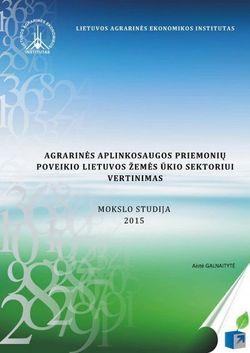
Sustainable farming and usage of natural resources is vital for food security and quality of life of current and future generations. A positive effect of agri-environmental measures on the environment is obvious, consequently their development is planned in the future. The research is relevant, because EU Member States are obliged to monitor and assess environmental and socio-economic impacts of the agri-environmental measures implemented. The currently used Common Monitoring and Evaluation Framework is criticized by the scientists, while it does not include relevant indicators for the implementation of agri-environmental measures evaluation and, insufficiently disclose the impact of those measures. This leads to the problem of the lack of methodology, enabling quantitatively assess the impact of agri-environmental measures on the technical, economic and social indicators in agricultural sector. Topicality of the research is also confirmed by the relatively high and constantly increasing financial resources, allocated for their implementation.
The objective of this research is to assess the impact of agri-environmental measures on Lithuanian agricultural sector.
The study presents the essence of agri-environmental measures, historical and political retrospective, and the impact ssessmentof those measures on the technical, economic and social indicators in agricultural sector.
Results. In order to contribute to the scientific debates on the impact of agri-environmental measures on agricultural sector and support policy decisions, the impact assessment methodology, based on qualitative and quantitative methods, and enabling a comprehensive impact assessment of all agri-environmental measures on the technical, economic and social indicators in agricultural sector, was prepared. It also may provide agri-environmental policy priorities that allocated funds are not fragmented and inefficient. The key element of the developed methodology is linear mathematical programming model, by which the impact of agri-environmental measures on the technical, economic and social indicators in agricultural sector was quantitatively assessed, as well as relevant scenario analysis was carried out. The results provide policy makers with objective, scientifically based knowledge on the impact of agri-environmental measures on Lithuanian agricultural sector. In addition, it helps to perceive how the realization of agri-environmental objectives of the CAP indirectly affects the economic behaviour of farmers. The prepared mathematical programming model of the quantitative assessment can be used in the academic community as a methodical training subject. The impact of compensatory payments to the willingness of participation in the agri-environmental measures is also estimated. The proposals for the agricultural policy within the field of agri-environment improvement are provided.
Key words: agricultural sector, agri-environmental measures, impact assessment, mathematical programming.
Galnaitytė, A. 2015. Agrarinės aplinkosaugos priemonių poveikio Lietuvos žemės ūkio sektoriui vertinimas: Mokslo studija. Vilnius: Lietuvos agrarinės ekonomikos institutas. 103 p.: iliustr., santr. angl. (online) ISBN 978-9955-481-55-3.
